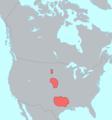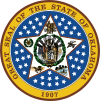Portal:Oklahoma
The Oklahoma Portal Oklahoma (/ˌoʊkləˈhoʊmə/ ⓘ OHK-lə-HOH-mə; Choctaw: Oklahumma, pronounced [oklahómma]; Cherokee: ᎣᎧᎳᎰᎹ, Okalahoma, pronounced [ògàlàhǒːmã́]) is a landlocked state in the South Central region of the United States. It borders Texas to the south and west, Kansas to the north, Missouri to the northeast, Arkansas to the east, New Mexico to the west, and Colorado to the northwest. Partially in the western extreme of the Upland South, it is the 20th-most extensive and the 28th-most populous of the 50 United States. Its residents are known as Oklahomans and its capital and largest city is Oklahoma City. The state's name is derived from the Choctaw words okla, 'people' and humma, which translates as 'red'. Oklahoma is also known informally by its nickname, "The Sooner State", in reference to the Sooners, settlers who staked their claims in formerly American Indian-owned lands until the Indian Appropriations Act of 1889 authorized the Land Rush of 1889 opening the land to white settlement. With ancient mountain ranges, prairie, mesas, and eastern forests, most of Oklahoma lies in the Great Plains, Cross Timbers, and the U.S. Interior Highlands, all regions prone to severe weather. Oklahoma is at a confluence of three major American cultural regions. Historically, it served as a government-sanctioned territory for American Indians moved from east of the Mississippi River, a route for cattle drives from Texas and related regions, and a destination for Southern settlers. There are currently 26 spoken in Oklahoma. According to the 2020 U.S. census, 14.2 percent of Oklahomans identify as American Indians, the highest indigenous population by percentage in any state. A major producer of natural gas, oil, and agricultural products, Oklahoma relies on an economic base of aviation, energy, telecommunications, and biotechnology. Oklahoma City and Tulsa serve as Oklahoma's primary economic anchors, with nearly two-thirds of Oklahomans living within their metropolitan statistical areas. (Full article...) Selected article -The Arkansas River is a major tributary of the Mississippi River. It generally flows to the east and southeast as it traverses the U.S. states of Colorado, Kansas, Oklahoma, and Arkansas. The river's source basin lies in Colorado, specifically the Arkansas River Valley. The headwaters derive from the snowpack in the Sawatch and Mosquito mountain ranges. It flows east into Kansas and finally through Oklahoma and Arkansas, where it meets the Mississippi River. At 1,469 miles (2,364 km), it is the sixth-longest river in the United States, the second-longest tributary in the Mississippi–Missouri system, and the 45th longest river in the world. Its origin is in the Rocky Mountains in Lake County, Colorado, near Leadville. In 1859, placer gold discovered in the Leadville area brought thousands seeking to strike it rich, but the easily recovered placer gold was quickly exhausted. The Arkansas River's mouth is at Napoleon, Arkansas, and its drainage basin covers nearly 170,000 square miles (440,000 km2). Its volume is much smaller than the Missouri and Ohio rivers, with a mean discharge of about 40,000 cubic feet per second (1,100 m3/s). (Full article...)Spotlight city -Cushing (Meskwaki: Koshineki, Iowa-Oto: Amína P^óp^oye Chína, meaning: "Soft-seat town") is a city in Payne County, Oklahoma, United States. The population was 7,826 at the time of the 2010 census, a decline of 6.5% since 8,371 in 2000. Cushing was established after the Land Run of 1891 by William "Billy Rae" Little. It was named for Marshall Cushing, private secretary to U.S. Postmaster General John Wanamaker. A 1912 oil boom led to the city's development as a refining center, with over 50 refineries operating in Cushing over its history. Today, Cushing is a major trading hub for crude oil and a price settlement point for West Texas Intermediate on the New York Mercantile Exchange and is known as the "Pipeline Crossroads of the World." (Full article...)Selected picture Credit: User:CPacker Seminary Hall served as the main building for the Cherokee Female Seminary from 1889 to 1909. Featured content
Featured lists: Oklahoma birds • Tallest buildings in Tulsa • List of tallest buildings in Oklahoma City • List of birds of Oklahoma • List of Oklahoma Sooners football seasons • List of Oklahoma Sooners head football coaches • List of Oklahoma Sooners in the NFL Draft State facts
State symbols
Selected biography -Blake Edwards (born William Blake Crump; July 26, 1922 – December 15, 2010) was an American film director, producer, screenwriter, and actor. Edwards began his career in the 1940s as an actor, but he soon began writing screenplays and radio scripts before turning to producing and directing in television and films. His best-known films include Breakfast at Tiffany's (1961), Days of Wine and Roses (1962), A Shot in the Dark (1964), The Great Race (1965), 10 (1979), Victor/Victoria (1982), Blind Date (1987), and the hugely successful Pink Panther film series with British actor Peter Sellers. Often thought of as primarily a director of comedies, he also directed several drama, musical, and detective films. Late in his career, he took up writing, producing and directing for theater. (Full article...)Did you know -
General images -The following are images from various Oklahoma-related articles on Wikipedia.
Related portalsWikiprojects
Things you can do
Oklahoma topicsCategoriesNew articlesThis list was generated from these rules. Questions and feedback are always welcome! The search is being run daily with the most recent ~14 days of results. Note: Some articles may not be relevant to this project.
Rules | Match log | Results page (for watching) | Last updated: 2024-04-28 21:24 (UTC) Note: The list display can now be customized by each user. See List display personalization for details.
Associated WikimediaThe following Wikimedia Foundation sister projects provide more on this subject:
Discover Wikipedia using portals |
- Pages using the Phonos extension
- Portals with triaged subpages from June 2018
- All portals with triaged subpages
- All portals
- Portals with no named maintainer
- Pages including recorded pronunciations
- Pages with Creek IPA
- Pages with Cherokee IPA
- Random portal component with 11–15 available image subpages
- United States portals by state or territory
- Oklahoma


























![Image 24Cartoonist's rendering of Theodore Roosevelt's initial reaction to the Oklahoma Constitution.[needs context] (from History of Oklahoma)](http://upload.wikimedia.org/wikipedia/en/thumb/2/28/Teddyrooseveltoklahomaconstitution.png/120px-Teddyrooseveltoklahomaconstitution.png)


























